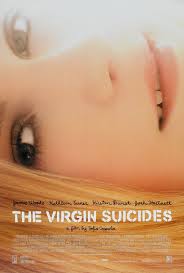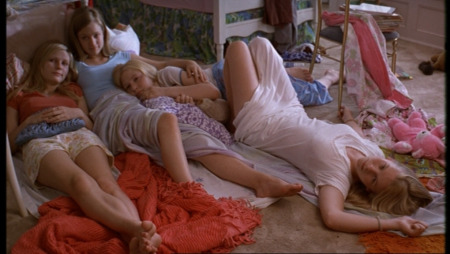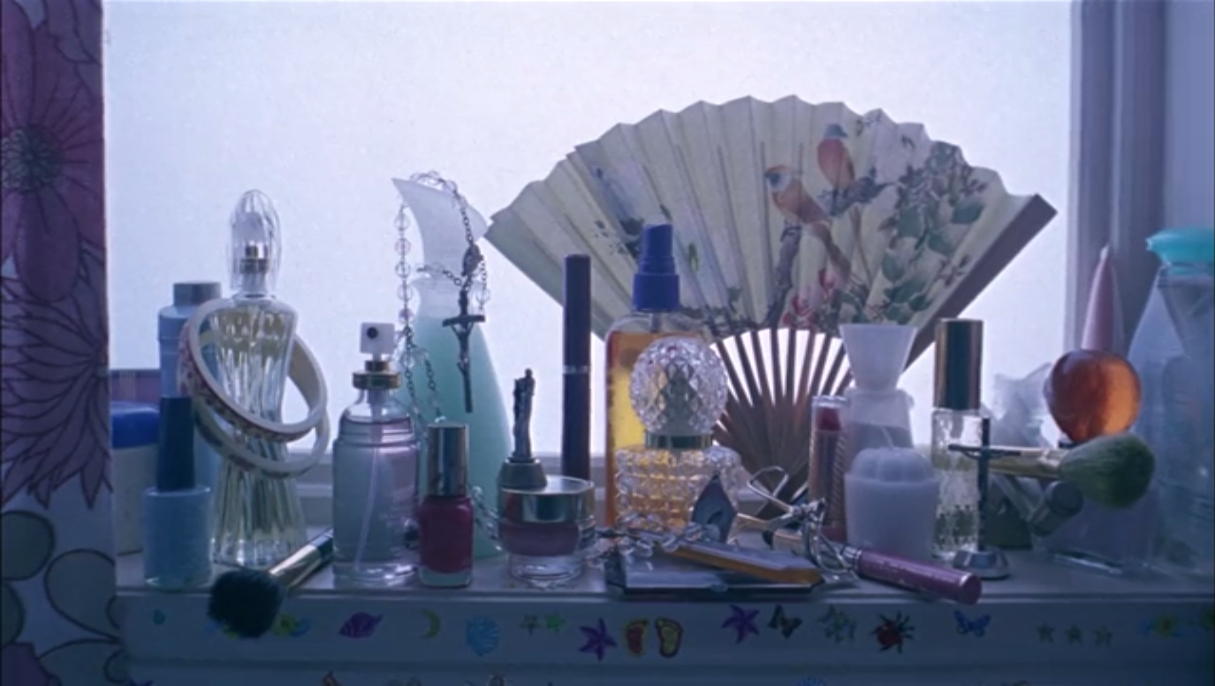Women's Pictures - Sofia Coppola's The Virgin Suicides
 Thursday, May 7, 2015 at 6:43PM
Thursday, May 7, 2015 at 6:43PM Welcome to Sofia Coppola Month on Anne Marie's series "Women's Pictures"...

Over the course of this series, I’ve noticed a pattern. So far, the first films our directors made have been smallish, personal movies; unpolished films that carry the seeds of themes and images that will grow as the directors do. The Virgin Suicides is not that movie. Sofia Coppola’s 1999 first feature film is neither small nor unpolished. While the film carries themes of isolation and adolescence that Coppola will continue to explore throughout her career, this is not the unpolished or underfunded first film of someone still learning the business. Starring two stars on the cusp of breakthrough (Kirsten Dunst and Josh Hartnett), as well as several well-loved actors (Kathleen Turner, James Woods, Danny DeVito), and shot by a cinematographer with 20 years of experience (Edward Lachman), this may be the most well-varnished first film we’ve seen.
Adapted by Coppola from Jeffrey Eugenides’s novel, The Virgin Suicides is a nostalgic suburban gothic. Set in 1970s Detroit, an unnamed narrator reminisces on his high school crush on the girls next door, five sisters who committed suicide for reasons he still can’t understand:
Everyone dates the decline of our neighborhood from the deaths of the Lisbon girls.

The film follows the narrator and his friends as they observe the five Lisbon sisters, the daughters of the conservative Catholic Math teacher Mr. Lisbon (James Woods) and his wife (Kathleen Turner). After Cecilia (Hannah Hall), the yougnest daughter, commits suicide, the family slowly unravels, and the remaining girls grow wilder. Of special interest to almost everyone is the wildest, Lux (Kirsten Dunst). As young love blooms, prom grows nearer, and the neighborhood trees succumb to fungus, the fact of death hangs over the film, rendering the already-precious moments of adolescence even more fleeting.
In their attempts to decipher the mystery of the Lisbon sisters, the group of boys pours over journals, baubles, and possessions, which make up the core visual metaphor of the film. Coppola continuously turns her camera towards the mundane details of the girls’ lives - tampons, lipstick, beads, and books - in order to delve into the girls’ lives. Some of these images are haunting - like Cecilia taping bright bracelets over her wrist bandages after her first suicide attempt. However, most of these brief still-life shots fail to shed much light on the girls’ inner lives. Other than sad Cecilia and restless Lux (given extra life by Hannah Hall and Kirsten Dunst, respectively), the sisters are indistinguishable from each other. In filling her film with these shots, Coppola has, to borrow a quote from Virginia Woolf, “given us a house in the hopes that we may be able to deduce the human beings who live there.” Unfortunately, the girls are more important as a unit: blond, beautiful, and doomed.

The Virgin Suicides, despite its title, is not a movie about the Lisbon sisters. This is a movie about the Detroit suburb in which they live, where the auto industry, the trees, and the teenagers are dying. This is a movie about the girls’ adult neighbors, who peer into the Lisbon’s lives displayed on television specials with unempathetic curiosity. This is a movie about the teenage boys living across the street, who pine for, lust after, and attempt to understand the girls, with that intensity unique to teenagers. Still, the movie suffers from a lack of strong individual characterization of either the girls or the boys who want them. Nonetheless, The Virgin Suicides captures the life-or-death ferocity of adolescent emotion. It would take Coppola’s next film for the writer/director to learn how to fill her characters’ inner lives.

Up Next:

5/14 - Lost in Translation (2003) - *Sofia Coppola's 44th Birthday!* Coppola's second film nabbed her a Best Original Screenplay Oscar for this bittersweet story of two Americans drifting through Japan. (Amazon Instant Watch)
5/21 - Marie Antoinette (2006) - Coppola courted her first bit of controversy for this anachronistic, pop-fuelled biopic, again starring Kirsten Dunst as the infamous monarch. (Amazon Instant Watch)
5/28 - Somewhere (2010) - Sofia Coppola turns inward for inspiration with a movie about a famous actor and his daughter living at the Chateau Marmont. (Amazon Instant Watch) (Netflix)



Reader Comments (15)
I think my favorite of hers is "Marie Antoinette." I think her other films are interesting without being fascinating. There always seems to be one key thing missing to make them feel complete.
Easily one of the best debut films and truly a gorgeous one. No one can create films like Sofia does and yes, she's better than her dad.
Excellent. I'm not a fan of Campion, but I love Coppola, so I can engage more with this one (without the need to fight the impulse of posting negative rants!)
Please tell me, though, that you are also going to cover BLING RING? It's my "equal favourite" (along with VIRGIN SUICIDES) of hers.
Travis C - Unfortunately, there are only 4 Thursdays in May, so we won't be covering The Bling Ring! Maybe you can convince Nathaniel to make it a HMWYBS...
I think it's a great first movie. It gets better with every viewing. It is so abstract and yet so specific.
I love the voice-over.
On a personal note, I really thought this movie would launch Kathleen Turner's career as a great character actress in meaty supporting roles. That never happened. Whatever.
I think it's a good debut but only a decent movie.
She started to lovingly develop her tone and mood which would become her best friends later on but the mechanics and horror of the plot don't jump off the screen. What should be devastating is only slightly disturbing. And the strong characterizations of her later films is nowhere to be found here, which does nothing to help penetrate the heart of the story.
My least fave of hers by a wide margin. I like Sofia best when she knows exactly what her characters are about and how they fully function within her created worlds. Plus, she's a master of atmosphere now and wields it like a firework.
The only movie of hers I liked. While she has had the critics and audience approval (sort of), I just find her to be nothing more than another result of nepotism.
This movie stunned me when I first saw it. It's interesting that it's often omitted from retrospectives about the great breakthroughs of 1999, which often tend to focus on hyper-masculine films like Fight Club and The Matrix. I always think of The Virgin Suicides as the great debut of that year.
The only Sofia Coppola film that (hides face) I haven't seen yet... I blame UK television for never showing it...
Can't wait for Marie Antoinette but am also a sucker for Anna Faris in Lost In Translation.
The Virgin Suicides was a fantastic debut, but with Coppola, every one of her films impressed me less than the one that came before it. By the time Somewhere came along, I couldn't even finish it. Her "inward" turn seems like a long slow erosion of talent, or perhaps the ability to communicate with an audience. I'll be curious to read along with your posts, Anne Marie, and see how her films strike you, back to back, with some distance.
Yay, I can finally participate in this series (after meaning to watch every single previous entry and failing to do so in time)!
The Virgin Suicides is my favorite S. Coppola film by a comfortable margin. I love the way she floats around the sisters through the early portion of the movie, filtering impressions and memories through multiple POVs before settling into a narrative that never really *fully* settles in. It's a very tricky balancing act and she pulls it off so beautifully. I really do think TVS is kind of perfect in its own quiet way, with a delicacy that makes it easy to overlook or dismiss (as so many people have with this and her subsequent films). Especially given how divisive some of SC's subsequent films were.
Funny, too, that so many people have mentioned it as a 1999 film. It played festivals in '99, but was a spring 2000 commercial release. I always remember that because the fall of 99 through spring of 2000 was such an exciting time to be going to the movies, and The Virgin Suicides was one of the last movies I saw in that stretch. (I also always remember it fondly because it was the last movie I saw during my freshman year of college).
San FranCinema: I haven't seen what she's made after Lost in Translation, but Marie Antoinette, from what I've heard, sounds like a kind of gender flipped version of Walker. But Walker's two big obvious anachronisms (Time Magazine and the ending helicopter) have WEIGHT and are clearly portrayed as big moments in context and are attached to a weightier film. Marie Antoinette's big obvious anachronism (the blue 1923 Chuck Taylors) isn't presented as nearly big enough, especially considering the featherweight tone of the piece should make anachronisms less attackable. She should be WEARING those Chucks to the party, frankly. (It's a massive problem I saw in critical analysis of 300: Rise of an Empire. The biggest critique that they seriously rose? Anachronisms. If it were going for the Kingdom of Heaven/Robin Hood aesthetic palate, complaining about blatant and obvious anachronisms makes sense. But LOOK at the aesthetic palate of 300 and 300: Rise of an Empire. Complaining about a movie with THAT aesthetic palate having anachronisms is like complaining about a musical having songs.)
i saw the virgin suicides at a late night friday screening after a busy week and feared i'd be too tired to appreciate it. it all worked out; by the end of the film i was half-conviced i'd dreamt it
Love the series, but I have to disagree a bit with this reading of TVS. I think the lack of individualization among sisters is more a feature than a fault - it's a product of the narrator we're assigned to, and the larger themes the film is aiming for. Isn't the frustration of never being able to really know these girls part of how this film addresses nostalgia and memory? I could see a version of this film where the Lisbon sisters get to explain themselves more, but it would be a pretty different project - might need to drop the narration entirely.
This is definitely my favorite film by Sophia; it's so incredibly beautiful and follows the book pretty well. Great review!